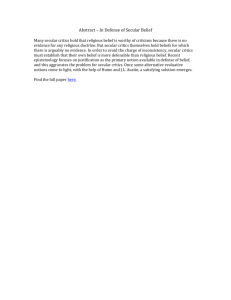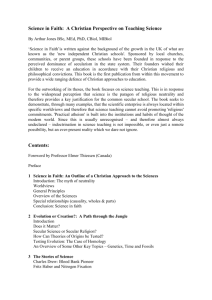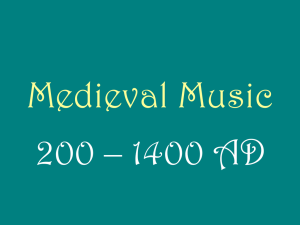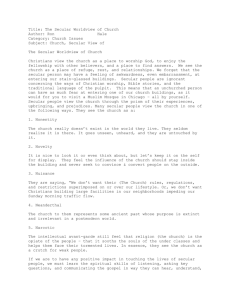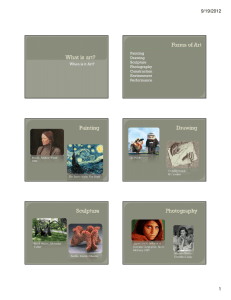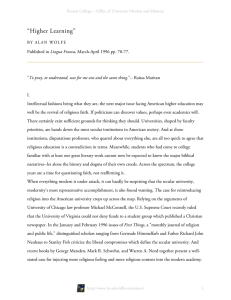“A Welcome Revival of Religion in the Academy"
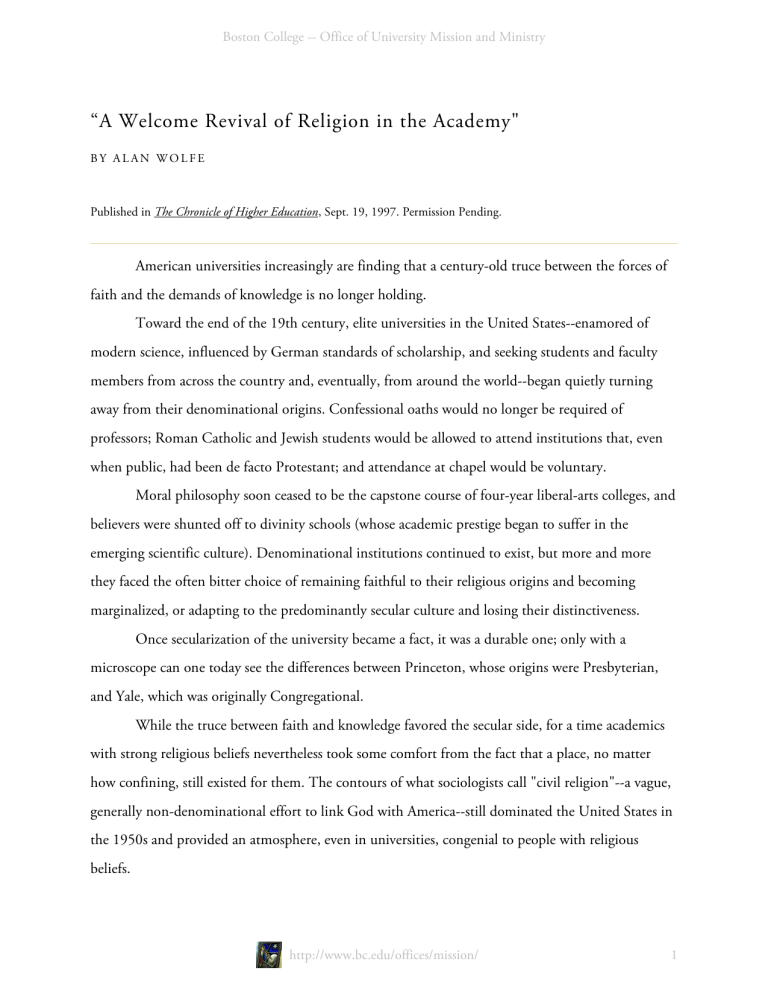
Boston College -- Office of University Mission and Ministry
“A Welcome Revival of Religion in the Academy"
B Y A L A N W O L F E
Published in The Chronicle of Higher Education , Sept. 19, 1997. Permission Pending.
American universities increasingly are finding that a century-old truce between the forces of faith and the demands of knowledge is no longer holding.
Toward the end of the 19th century, elite universities in the United States--enamored of modern science, influenced by German standards of scholarship, and seeking students and faculty members from across the country and, eventually, from around the world--began quietly turning away from their denominational origins. Confessional oaths would no longer be required of professors; Roman Catholic and Jewish students would be allowed to attend institutions that, even when public, had been de facto Protestant; and attendance at chapel would be voluntary.
Moral philosophy soon ceased to be the capstone course of four-year liberal-arts colleges, and believers were shunted off to divinity schools (whose academic prestige began to suffer in the emerging scientific culture). Denominational institutions continued to exist, but more and more they faced the often bitter choice of remaining faithful to their religious origins and becoming marginalized, or adapting to the predominantly secular culture and losing their distinctiveness.
Once secularization of the university became a fact, it was a durable one; only with a microscope can one today see the differences between Princeton, whose origins were Presbyterian, and Yale, which was originally Congregational.
While the truce between faith and knowledge favored the secular side, for a time academics with strong religious beliefs nevertheless took some comfort from the fact that a place, no matter how confining, still existed for them. The contours of what sociologists call "civil religion"--a vague, generally non-denominational effort to link God with America--still dominated the United States in the 1950s and provided an atmosphere, even in universities, congenial to people with religious beliefs. http://www.bc.edu/offices/mission/ 1
Boston College -- Office of University Mission and Ministry
Today, a vigorous round of criticism of the modern university has been touched off by critics who, arguing in the name of religion, insist that secularization has gone too far. If they had their way, the modern university would change a wide variety of its intellectual practices. Professors would talk openly about how their religious beliefs influence their work. They would apply for academic jobs without fear that making their religious views public would destroy their chances of being hired.
Students would be encouraged to speak more in class about their beliefs and to bring a religious voice to their extracurricular activities, including athletics and student newspapers. In general, the academic culture would become more amenable to religion.
The most sustained attack on the secular culture of the modem university has been launched by George Marsden, a (Protestant) historian at the (Catholic) University of Notre Dame. Marsden starts from the postmodern premise that objectivity is not a neutral standard between true stories and false ones, but a story like any other. If there are feminist ways of knowing, he implicitly asks, aren't there Christian ones as well? Once the epistemological claims underlying modern ideals of disinterested scholarship are challenged, he argues, so must be the compromise that assigned secondclass status to religious believers in the modern university.
Marsden's voice is by no means the only one that has entered the debate over the proper role of religion in the modern university. Some philosophers are giving new attention to philosophy and religion, delving into the spiritual thought of writers such as Kierkegaard, Nietzsche, and Heidegger.
Literary critics are beginning to explore the fact that, although modern societies may be predominantly secular, the novelists they produce--John Updike, Harry Mulisch, Robertson Davies,
Iris Murdoch--deal with age-old religious themes, such as the origin of evil or the promise of redemption.
Among some social scientists, there is a new awareness that supposedly scientific studies of how religion affects society have not, after all, yielded all that much scientific understanding, making at least plausible the claim that those who are religious themselves are in a better position than nonbelievers to understand why other human beings might find religion valuable. Even the natural sciences have experienced the new atmosphere; Darwinian evolutionary theory cannot explain life's http://www.bc.edu/offices/mission/ 2
Boston College -- Office of University Mission and Ministry complexity, the biochemist Michael Behe of Lehigh University has argued, concluding that some kind of intelligent design, possibly divine, has played a role in determining how life has developed.
If and when secular-minded academics notice these trends, they tend to cite them as examples of how grateful we all should be that the universities have parted company with God: Most scholars are deeply skeptical of what they perceive as any threat to the established truce between religion and higher education.
I consider myself a secular academic; my own field of study, sociology, could not have come into being until thinkers stopped attributing the origins of society to God. I believe that universities are properly governed by the rules of science and the mindset of liberalism, both committed to an avoidance of dogma and a respect for facts. Yet there are at least two reasons to welcome, rather than to ignore, the revival of religion in the academy: Religion can extend the pluralism that liberal values cherish, and it can expand and enrich knowledge.
As long as most Americans were religious, and as long as their religion was predominantly
Protestant, people who advocated such liberal values as academic freedom and a rejection of dogma were on the side of pluralism: The more universities there were, the more diverse perspectives would exist; the more open universities were to different viewpoints, the greater the chances that skepticism and free inquiry would be assigned a high priority. But today we risk a different kind of homogenization--we have become so secular that we leave little room for religious expression.
If anything, the secular version of the university has been such a success that its way of doing business constitutes a new orthodoxy. I happen to like much of this orthodoxy, especially its respect for facts and logic. But this does not mean that I necessarily appreciate the sameness that follows from discouraging those whose understanding of the world is tied to their faith from being active participants in university life. Objectivity should never be taken for granted. Those who value it need those who question its premises.
Nor does it follow that our commitments to secularism ought to be so strong that they preclude a role for colleges that are affiliated with a denomination. As a parent, I would not want to send my child to a church-related institution. The whole point of a college education is to teach an appreciation for skepticism and an exposure to unfamiliar ideas. But some parents do want to send http://www.bc.edu/offices/mission/ 3
Boston College -- Office of University Mission and Ministry their children to colleges affiliated with their religious faith. Surely a liberal pluralist ought not to denigrate them for doing so--but that is what many academics do. Too many of them talk and act as though denominational institutions are automatically second-rate. Just as one does not need to be a feminist to recognize a legitimate role for women's colleges, one docs not need to be religious to understand the importance of religious institutions.
George Marsden argues that liberals are tolerant of everything except people whom they regard as intolerant, which includes those who have strong religious faith. On this point, he is right.
Academics who respond with contempt to dissenters from the liberal consensus undermine liberalism more than do critics of liberalism such as Marsden. Many people who today criticize higher education in the name of religion are asking to have a conversation, not to make converts.
For example, the Lilly Foundation is sponsoring a three-year seminar on religion and higher education to study how church-affiliated institutions can play a more visible role in the American educational landscape. The seminar, composed of many of the leading critics of academe's secular culture, has gone out of its way to make liberal secularists--including David Hollinger, a historian at the University of California at Berkeley; Richard Bernstein, a philosopher at the New School for
Social Research; and myself--comfortable.
Secular academics also ought to listen more to their religious critics because, at least in the social sciences and the humanities, doing so can enhance scholars' understanding of the world.
Consider, first, the students.
Once, they came to the university sure of their religious beliefs. Many professors--except those teaching at institutions affiliated with a religious denomination--took special delight in trying to disabuse students of their faith. These days, however, students often come to class with no beliefs, or with little knowledge of the religious texts from which their beliefs are drawn.
For a long time, I was envious of my colleagues who taught at Catholic universities because, I thought, their students at least had heard of Augustine and Aquinas. Not so today: my friends tell me that their students, while nominally Catholic, have had the same bland, suburban upbringing as any other middle-class student in America, with the resulting same deep ignorance of religion. http://www.bc.edu/offices/mission/ 4
Boston College -- Office of University Mission and Ministry
Whether they attend a Catholic institution or an aggressively secular one, students today are lacking something that a stronger religious background could provide.
Today's college students are in desperate need of at least three dispositions usually associated with religious belief: a tragic view of life, grounding in a particular set of ethical maxims, and a sense of wonder. It is not that I long for students to appear in my classroom who can cite chapter and verse from the Bible in defense of positions on which they will never reflect. But I would not mind an occasional argument, backed up by familiarity with at least one historical tradition, in support of a passionately held viewpoint on something--anything.
The students whom I teach are so tolerant of so many things that I wonder just how deep that tolerance runs. I would like to find an occasional student who, despite my contrary views, would articulate the position that homosexuality is sinful, or that abortion constitutes infanticide, if for no other reason than to make the point that ideas about right and wrong ought to generate disagreement rather than encourage easy conformity. If renegotiating the truce between faith and knowledge were to produce more of a spark in a typical classroom discussion, I would be in favor of it.
Such renegotiation might also bring a valuable new perspective to our scholarship. We must recognize that scholarship has been affected by the university's secularism in some less than positive ways. This is not an argument that is "soft" on creationism. A scientist legitimately may suggest, as
Michael Behe does, that Darwinian theory does not explain everything. But to invoke, as Behe also does, the possibility of intelligent design is a cop-out: When something is not easily understood, a scientist should dig further to understand it You do not understand nature by invoking the supernatural.
But even if we accept that the boundary between religion and secularism should not shift all that much in the sciences, this does not mean that all other branches of learning need to include the same boundary. The humanities--because they deal with texts that explore the mysteries of art, creation, love, evil, envy, meaning, and purpose--have much to gain from renegotiating the border.
English professors in recent years have produced much interesting scholarship on the historical background, economic and political context, and hidden assumptions about gender in many classic http://www.bc.edu/offices/mission/ 5
Boston College -- Office of University Mission and Ministry texts, but far less about the beliefs, creative urges, and frequent apocalyptic visions of the authors of those classics.
To study the world's great literary works, many of which were inspired by religious questions, without full appreciation of those questions is like performing Hamlet without the Prince.
Critics of academic specialization in the humanities often say that English departments, infatuated with contemporary works, no longer teach enough Milton or Tolstoy. It would be more correct to say that, through the lens of secularism, they are teaching them inaccurately.
It is in the social sciences, however, that a new settlement between faith and knowledge might have the most beneficial effects. Religion was central to the investigations of Durkheim and
Weber, the great founders of modern sociology, not because of their own commitments to faith, but because of a restless curiosity about all things human. It is precisely that driving curiosity that is missing in so much of the formal modeling and mathematical precision now sought by social scientists.
To develop laws of social behavior, scholars make often admittedly simplistic assumptions about how people behave. Alas, one of the aspects of human conduct that scholars ignore, because it seems imprecise, is how we attribute meaning to the world around us. By reintroducing respect for human beings as creators of meaning, the rediscovery of religion can help revive interest in all of the ways that people interpret and symbolize their place in the world.
The value in what the religious critics have to say will be lost if the debate that they inspire takes us back to the days of the Scopes trial. Many who cherish secular values see in every attempt to invoke religion new forms of superstition. They need to be reminded that the secular side, after all, won the Scopes trial. Rationality, logic, and the scientific method have triumphed so thoroughly in the modern university that those of us who live by those tenets could be a bit more generous in welcoming critics of our bedrock assumptions.
At the same time, religious believers cannot expect much of a hearing in the modern research university unless they meet the standards of open inquiry and liberal pluralism halfway. Some critics of higher education see themselves as minorities, victimized for their religious beliefs just as women and African-Americans have been victimized for their gender and race. Some even say it follows that http://www.bc.edu/offices/mission/ 6
Boston College -- Office of University Mission and Ministry they should have academic programs in the university based on religious identity, just as universities have programs in feminist or African-American studies. Such claims strike me as the wrong way to accommodate religious belief. Ghettoizing religion in separate departments or programs would not fundamentally change the intellectual life of the rest of the university.
Liberals can find in liberalism plenty of resources for skepticism toward religion. Believers can find support in their religious traditions for suspicion of liberal secularism. Yet each side, to bring out what is best in its own heritage, will have to move toward the other.
Alan Wolfe, University Professor at Boston University, is the author of Marginalized in the
Middle (University of Chicago Press, 1996). http://www.bc.edu/offices/mission/ 7
